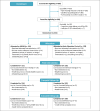Effectiveness of a Meta-Cognitive Group Intervention for Older Adults with Subjective Cognitive Decline or Mild Cognitive Impairment: The ASPIRE Randomized Controlled Trial
- PMID: 39559867
- PMCID: PMC11573849
- DOI: 10.14283/jpad.2024.166
Effectiveness of a Meta-Cognitive Group Intervention for Older Adults with Subjective Cognitive Decline or Mild Cognitive Impairment: The ASPIRE Randomized Controlled Trial
Abstract
Background: Subjective cognitive decline (SCD) and mild cognitive impairment (MCI) can lead to functional and cognitive decline, increasing dementia risk. There is a pressing need for interventions that prevent this deterioration. The ASPIRE (Adult Strategies Put Into Real-world Environments) intervention was developed to improve performance of daily activities.
Objectives: The primary objective was to determine whether ASPIRE was more effective than a Brain Education control intervention in improving performance and satisfaction with daily life activities that were not specifically trained in the intervention. Secondary objectives were to explore: 1) whether ASPIRE was more effective in improving self-reported health and quality of life, and performance on cognitive tests; and 2) maintenance of change over six-months.
Design: Double-blind, two-armed, parallel randomized controlled trial, with a six-month follow-up period.
Setting: Community based, Greater Toronto Area.
Participants: Two-hundred sixty-four older adults (aged 70.8 ± 6.6 years) with SCD or MCI, randomized to ASPIRE (n=131) or a Brain Education active control arm (n= 133).
Intervention: ASPIRE is a 10-week meta-cognitive group intervention focusing on strategy acquisition and application to improve performance of individualized daily activity identified by each participant as important. It involves setting goals, creating tailored plans, and iteratively modifying these plans with support from the group members and facilitator.
Measurements: Performance of and satisfaction with daily activities was rated on a 10-point Likert scale using the Canadian Occupational Performance Measure (COPM). Secondary outcome were subjective cognition, depression, anxiety, self-efficacy, quality of life, and cognitive tests of memory and executive functions.
Results: Post-intervention, clinically significant improvement of untrained activities (two points or more on the COPM) was found in 32.5% in ASPIRE; and 30.6% in the control arm, with no significant between group differences (Performance: (exp(β ̂) =0.96, z=-0.15, p=.879); Satisfaction: (exp(β ̂) =0.94, z=-0.29, p=.775). The improvements remained stable over six months in both arms. No significant group effects were found on the secondary outcomes, but improvements were found on subjective cognition and self-efficacy in both arms post intervention.
Conclusion: Both a meta-cognitive strategy approach and an adult learning activity resulted in positive changes in subjective cognition, self efficacy, and, to a certain extent, engagement in daily activities.
Keywords: Subjective cognitive decline; functional performance; group intervention; mild cognitive impairment; randomized controlled trial.
Conflict of interest statement
All authors declare that they have no conflicts of interest.
Figures
References
-
- American Psychiatric Association. Diagnostic and Statistical Manual of Mental Disorders. 5th ed. American Psychiatric Association; 2013.
Publication types
MeSH terms
LinkOut - more resources
Full Text Sources
Medical



